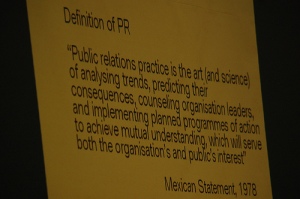Last week, I had the chance to listen to Lorri Rishar Jandron, president and CEO of Edge Partnerships. She is a PR practioner who used to work as a reporter, so she has a pretty solid grasp of media relations. She had some solid tips I wanted to share:
- Be honest
- Know the subject
- Don’t speak off the record
- Accept media requests
- Stay focused, stay brief
- Answer the question you want to answer
- Stay cool
- It’s quality, not quantity
- If you don’t have something nice to say, don’t say it
- When all else fails, return to #1
I feel that media relations is one of the most difficult parts of PR to teach. From my experience, I have seen that the best of kind of media relations occurs not on a cold call or when working down a huge list of contacts. It occurs over time through mutually beneficial relationships between PR practitioners and journalists. But how do you teach that in a classroom? And how do you teach good media relations through a 12-week internship? I think starting with the basics and learning as you go is the best kind of approach. Also, I like the Catching Flack blog – it has some pretty good media relations tips.

As far as principles to remember, here’s what I’ve come up with: Good media relations starts with attitude. If you have a couple of reporters to call, make sure you don’t rush the calls and thoroughly review the material you’re pitching. Keep your cool and don’t get annoyed. Any position that requires a lot of phone time is really helpful in media relations and in your PR internship, especially a sales position.
After you figure out how to develop a good attitude, becoming an expert in the appropriate industry is important. Chances are, if you’re on the phone with the reporter talking about a news release, they will probably want information that’s not on the release. Keep up with the appropriate industry publications and news and you should be able to hold your own and answer questions. I also like to have a list of the key messages right next to me just in case.
One other thing to remember is the fact that newsrooms across the country are shrinking. Journlists are getting cut left and right, and beat reporters aren’t necessarily experts in that industry. Reporters like to say their deadline was yesterday (with pretty much everything they do), so they are extremely crunched for time. This is such a great opporutnity for PR practitioners to step in and help out, btu also keeping in mind what each media outlet sees as news. For more commentary on the shrinking newsroom, check out a post by Mike Cherenson on PRSAY.
During my internships, I had the chance to do a lot of media relations. I made some mistakes and had some shining moments, but I would never get on the phone and treat a journalist like crap. Too many times I’ve seen articles that talk about “dealing” with the media. Seriously, deal with the media? Lorri talked about this and how she will never say she “deals” with the media. They’re not stupid and they have their own job to do. Part of our job as PR practitioners is to work with them and help them with their job. By saying part of a job is to “deal” with the media, it’s pretty much demeaning their profession and that’s a bad attitude. PR folks work with the media, and it should be left as that.
For me, it brings up the question: are we being trained to hate the media? I don’t think so, but I think new student PR practitioners have a very unrealistic perception of what real media relations is. Getting solid experience in working with the media will help you prepare for a career in public relations.
What else? Sure, it’s easy for me to comment about media relations education, but what do you think is the best way to learn media relations? Any tips for students or new practitioners?
Filed under: Professional Development, Public Relations, attitude, edge partnerships, journalist, media relations, mike cherenson, pr practitioner, prsay, Public Relations








Recent Comments